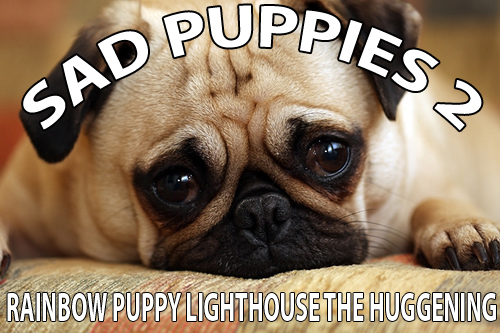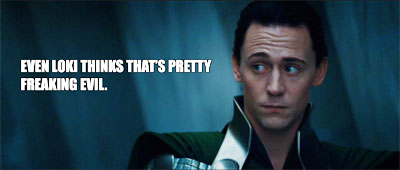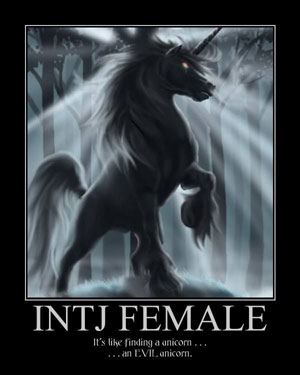*drumming on a table that looks like it belongs in a kitchen from the 1950s*
New McCarthy, Loads of bitchin’, Monster Huntin’, Internetin’
Trad Publishing, Indie Pubbing, and Jeff Bezos
Blacklisting, Barflies, Evil League and Rabbit Guys
eBooks, ePub, mobi rise — nook flames out in Kindle’s fires
*chorus repeats*
I am so not a songwriter so the lyrics are actually the part of the post that takes me the longest to come up with, guys. 🙂 I hope you’re enjoying them.
So, this post is going to look at the Sad Puppies 2 era. SP2 was a lot more organized and successful than SP1 and it caught much more attention. It was headed up by Larry Correia and announced in this post over at his site. As with SP1, SP2 did not initially advocate for any specific works and, from that post, the central theme was this:
The ugly truth is that the most prestigious award in sci-fi/fantasy is basically just a popularity contest, where the people who are popular with a tiny little group of WorldCon voters get nominated and thousands of other works are ignored. Books that tickle them are declared good and anybody who publically deviates from groupthink is bad. Over time this lame ass award process has become increasingly snooty and pretentious, and you can usually guess who all of the finalists are going to be that year before any of the books have actually come out or been read by anyone, entirely by how popular the author is with this tiny group.
This is a leading cause of puppy related sadness.

The only thing missing is “Think of the children…”
However, while nomination and discussion about who should be nominated was going on, a very fun thing happened in the sci-fi/fantasy world. Tor.com started a rather big dust-up over ending binary gender usage in sci-fi and fantasy works. From that post:
Conversations about gender in SF have been taking place for a long time. I want to join in. I want more readers to be aware of texts old and new, and seek them out, and talk about them. I want more writers to stop defaulting to binary gender in their SF—I want to never again read entire anthologies of SF stories or large-cast novels where every character is binary-gendered. I want this conversation to be louder.
Note that she’s not saying “I want people to come up with races where gender/sex traits are different” or “I’d like an exploration of what it means to be a man or a woman in a given culture” or that she wants an end to gendered roles or anything like that. What she wants is to continue the current clusterfuck of chaotic confusion that is crossing between the kink and LGBT community with the genderqueer. However, she’s actually being a few billion magnitudes of order less understanding and tolerant than they are — the genderqueer and those who don’t identify with their apparent physical sex know that they’re going against biological norms (the word norm is being used in a statistical sense just like my being blonde is abnormal) and they do *not* expect everyone to know how to address them on sight. They also know that most people do identify with their birth sex. Further, they’re not demanding that the whole of society change itself and its language to accommodate them without them making any concessions.
I’m pretty damned tolerant and “whatever, so long as I don’t have to pay for it ’cause I’m skint.” I’ve got gay friends, trans friends, genderqueer friends… I even have one friend who is a gay, trans black man. However, none of them have an issue with gendered characters. All of them *write* characters that are binary gendered. If they have a character that is genderqueer or goes against the binary system, that character is the exception (if the cast is human. In cases where we’re dealing with an alien race, all bets are off). Still, when Tor.com posted this little thing, it set the entire sci-fi/fantasy world alight and kicked SP2 into high gear. Larry Correia had a lot to say about this particular bit of social justice insanity.
There’s a reason I mention it here and you’ll see in a bit. At any rate, SP2 continued until the nominations were chosen and then submitted with reminders of how to nominate and reminders about when nominations were getting close to ending as well as when the nominees were announced and the resulting aftermath that followed the awards ceremony. Sad Puppies 2 was the beginning of the deeper reflection on how the Hugos, SJWs, and the trends in sci-fi and fantasy publishing were not just an anomaly but were part of a greater culture war.
Remember the “end of binary gendering” thing I mentioned earlier? Well, 2014 was the year that Larry Correia really started riling up the SJWs (at least that I can see) and the Sad Puppies effort in many ways became a bit of a rallying cry for many sci-fi and fantasy authors across the Internet to discuss the SJW incursion into their realm.
Keep in mind that this happened eight months before GamerGate.
People were getting sick and tired of being preached at. They were sick of token diverity-ism that was being held up as more important than the story and the way that identity politics and the author’s personal life and beliefs were used in place of actually judging whether or not their work was well-written, entertaining, and told a good story where the message played a role.
If you read the discussions, you’ll see that much of it is well-thought-out arguments about the problems of writing non-binary characters as well as the truth about historical depictions of women in sci-fi that flew in the face of the alternate reality the SJWs were advancing.
Not that that stopped them. They went after Larry Correia very hard in 2014 with File 770 and the Guardian attacking him and misrepresenting what he was hoping to achieve with Sad Puppies. The Guardian journalist, Damien Walter continued his attack on Larry’s Facebook page.
In August 2014, GamerGate happened and in November came ShirtStorm which had some overlap with the SP community due to shared interest (just like there is overlap between people who like French cooking and people who like French wine). However, SP2 really just served to underscore Correia’s initial points about the Hugos and caused the movement to gain more attention than SP1 had.
It was the next year’s effort, Sad Puppies 3, that really blew the lid off the entire mess. That will be the subject of the next entry.
— G.K.
















